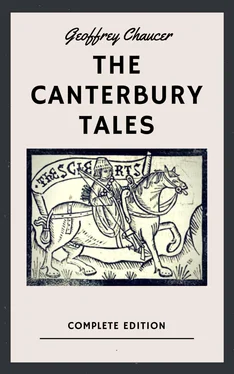Benign he was, and wonder diligent,
And in adversity full patient:
And such he was y-proved *often sithes*. *oftentimes*
Full loth were him to curse for his tithes,
But rather would he given out of doubt,
Unto his poore parishens about,
Of his off'ring, and eke of his substance.
*He could in little thing have suffisance*. *he was satisfied with
Wide was his parish, and houses far asunder, very little*
But he ne left not, for no rain nor thunder,
In sickness and in mischief to visit
The farthest in his parish, *much and lit*, *great and small*
Upon his feet, and in his hand a staff.
This noble ensample to his sheep he gaf*, *gave
That first he wrought, and afterward he taught.
Out of the gospel he the wordes caught,
And this figure he added yet thereto,
That if gold ruste, what should iron do?
For if a priest be foul, on whom we trust,
No wonder is a lewed* man to rust: *unlearned
And shame it is, if that a priest take keep,
To see a shitten shepherd and clean sheep:
Well ought a priest ensample for to give,
By his own cleanness, how his sheep should live.
He sette not his benefice to hire,
And left his sheep eucumber'd in the mire,
And ran unto London, unto Saint Paul's,
To seeke him a chantery<42> for souls,
Or with a brotherhood to be withold:* *detained
But dwelt at home, and kepte well his fold,
So that the wolf ne made it not miscarry.
He was a shepherd, and no mercenary.
And though he holy were, and virtuous,
He was to sinful men not dispitous* *severe
Nor of his speeche dangerous nor dign* *disdainful
But in his teaching discreet and benign.
To drawen folk to heaven, with fairness,
By good ensample, was his business:
*But it were* any person obstinate, *but if it were*
What so he were of high or low estate,
Him would he snibbe* sharply for the nones**. *reprove **nonce,occasion
A better priest I trow that nowhere none is.
He waited after no pomp nor reverence,
Nor maked him a *spiced conscience*, *artificial conscience*
But Christe's lore, and his apostles' twelve,
He taught, and first he follow'd it himselve.
With him there was a PLOUGHMAN, was his brother,
That had y-laid of dung full many a fother*. *ton
A true swinker* and a good was he, *hard worker
Living in peace and perfect charity.
God loved he beste with all his heart
At alle times, were it gain or smart*, *pain, loss
And then his neighebour right as himselve.
He woulde thresh, and thereto dike*, and delve, *dig ditches
For Christe's sake, for every poore wight,
Withouten hire, if it lay in his might.
His tithes payed he full fair and well,
Both of his *proper swink*, and his chattel** *his own labour* **goods
In a tabard* he rode upon a mare. *sleeveless jerkin
There was also a Reeve, and a Millere,
A Sompnour, and a Pardoner also,
A Manciple, and myself, there were no mo'.
The MILLER was a stout carle for the nones,
Full big he was of brawn, and eke of bones;
That proved well, for *ov'r all where* he came, *wheresoever*
At wrestling he would bear away the ram.<43>
He was short-shouldered, broad, a thicke gnarr*, *stump of wood
There was no door, that he n'old* heave off bar, *could not
Or break it at a running with his head.
His beard as any sow or fox was red,
And thereto broad, as though it were a spade.
Upon the cop* right of his nose he had *head <44>
A wart, and thereon stood a tuft of hairs
Red as the bristles of a sowe's ears.
His nose-thirles* blacke were and wide. *nostrils <45>
A sword and buckler bare he by his side.
His mouth as wide was as a furnace.
He was a jangler, and a goliardais*, *buffoon <46>
And that was most of sin and harlotries.
Well could he steale corn, and tolle thrice
And yet he had a thumb of gold, pardie.<47>
A white coat and a blue hood weared he
A baggepipe well could he blow and soun',
And therewithal he brought us out of town.
A gentle MANCIPLE <48> was there of a temple,
Of which achatours* mighte take ensample *buyers
For to be wise in buying of vitaille*. *victuals
For whether that he paid, or took *by taile*, *on credit
Algate* he waited so in his achate**, *always **purchase
That he was aye before in good estate.
Now is not that of God a full fair grace
That such a lewed* mannes wit shall pace** *unlearned **surpass
The wisdom of an heap of learned men?
Of masters had he more than thries ten,
That were of law expert and curious:
Of which there was a dozen in that house,
Worthy to be stewards of rent and land
Of any lord that is in Engleland,
To make him live by his proper good,
In honour debtless, *but if he were wood*, *unless he were mad*
Or live as scarcely as him list desire;
And able for to helpen all a shire
In any case that mighte fall or hap;
And yet this Manciple *set their aller cap* *outwitted them all*
The REEVE <49> was a slender choleric man
His beard was shav'd as nigh as ever he can.
His hair was by his eares round y-shorn;
His top was docked like a priest beforn
Full longe were his legges, and full lean
Y-like a staff, there was no calf y-seen
Well could he keep a garner* and a bin* *storeplaces for grain
There was no auditor could on him win
Well wist he by the drought, and by the rain,
The yielding of his seed and of his grain
His lorde's sheep, his neat*, and his dairy *cattle
His swine, his horse, his store, and his poultry,
Were wholly in this Reeve's governing,
And by his cov'nant gave he reckoning,
Since that his lord was twenty year of age;
There could no man bring him in arrearage
There was no bailiff, herd, nor other hine* *servant
That he ne knew his *sleight and his covine* *tricks and cheating*
They were adrad* of him, as of the death *in dread
His wonning* was full fair upon an heath *abode
With greene trees y-shadow'd was his place.
He coulde better than his lord purchase
Full rich he was y-stored privily
His lord well could he please subtilly,
To give and lend him of his owen good,
And have a thank, and yet* a coat and hood. *also
In youth he learned had a good mistere* *trade
He was a well good wright, a carpentere
This Reeve sate upon a right good stot*, *steed
That was all pomely* gray, and highte** Scot. *dappled **called
A long surcoat of perse* upon he had, *sky-blue
And by his side he bare a rusty blade.
Of Norfolk was this Reeve, of which I tell,
Beside a town men clepen* Baldeswell, *call
Tucked he was, as is a friar, about,
And ever rode the *hinderest of the rout*. *hindmost of the group*
A SOMPNOUR* was there with us in that place, *summoner <50>
That had a fire-red cherubinnes face,
For sausefleme* he was, with eyen narrow. *red or pimply
As hot he was and lecherous as a sparrow,
With scalled browes black, and pilled* beard: *scanty
Of his visage children were sore afeard.
There n'as quicksilver, litharge, nor brimstone,
Boras, ceruse, nor oil of tartar none,
Nor ointement that woulde cleanse or bite,
That him might helpen of his whelkes* white, *pustules
Nor of the knobbes* sitting on his cheeks. *buttons
Well lov'd he garlic, onions, and leeks,
And for to drink strong wine as red as blood.
Then would he speak, and cry as he were wood;
And when that he well drunken had the wine,
Читать дальше












